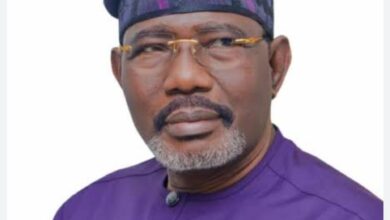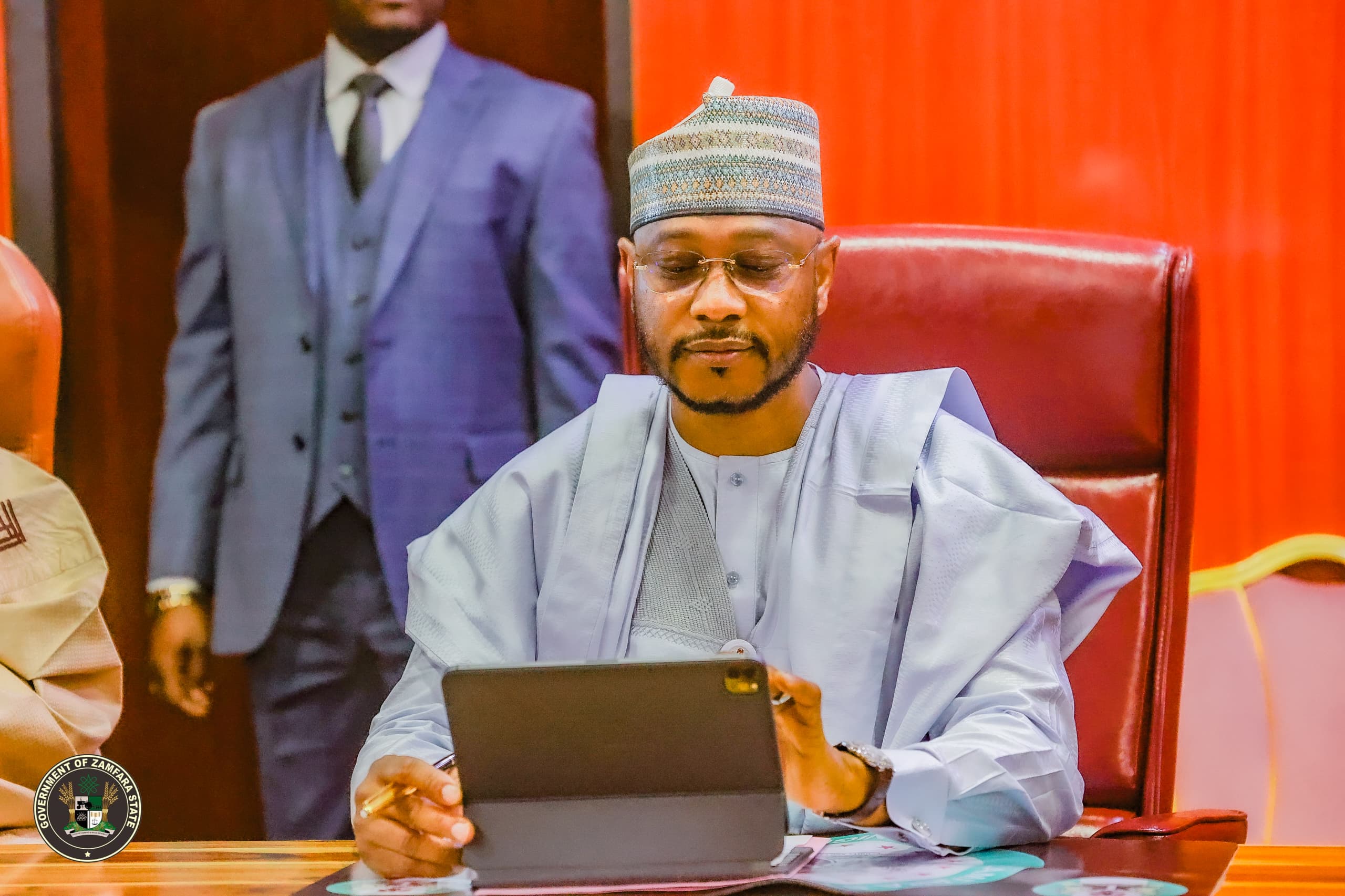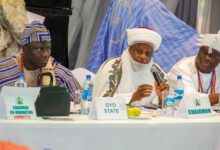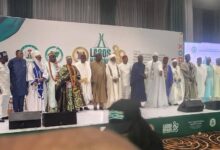Isinkan Kingdom and Akintide’s crocodile tributes to Osolo to further Akure’s hegemony
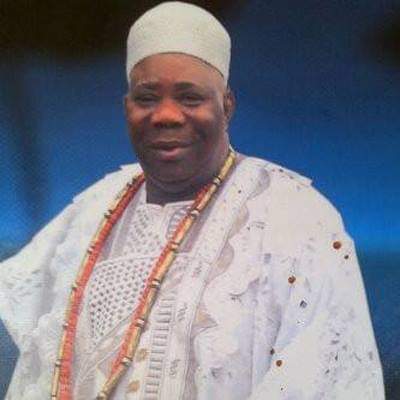
By KUNLE ARIYO
Wumi Akintide is a grandson of Oba Adesida Olofinlade (Afunbiowo) who reigned in Akure between 1897 and 1957. Akintide fancies himself as a historian with fidelity to impartial documentation for posterity even when the average reader can easily see through his veiled mission to entrench a contrived imperial significance upon his grandfather’s throne and portray that fabrication as a fact of history. This is a recurrent theme in all his writings.
His knowledge of history is undoubtedly limited to the overdose of palace propaganda he was fed whilst growing up because his writings, time and again, have proven beyond every iota of doubt that he knows very little about the history of Isolo or that of Isinkan. He has leveraged the opportunity of being unchallenged to propagate a patently false and violently reckless assault on the histories of adjoining communities that were part of the old Akure Division but totally outside the authority of Akure or his Akure kingdom.
The recent barrage of insults that Wumi Akintide heaped upon the late Kabiyesi, Oba Kayode Oluwatuyi, the Osolo of Isolo Kingdom in Akure South Local Government area of Ondo State, in the guise of a tribute, is the latest such duplicitous attempt by Akintide to egregiously downgrade the status of communities adjoining his Akure in a futile attempt to attach non-existent imperial glory to his grandfather’s throne.
Every child in Isolo for example knows that the late Oba Oluwatuyi, who was the grandson of Osolo Abibiri lived and died in quest of only one legacy – for the modern government to confer due recognition upon the throne of his ancestors as they have done in the case of other traditional rulers across Yoruba land, including that of the Deji of Akure. Osolo Oluwatuyi’s quest was not for him to be upgraded to an Oba. He was already an Oba. He was enthroned as an Oba in accordance with the custom and traditions of Isolo. He was never enthroned as a Chief. Up until the days of Oluwatuyi, no Osolo of Isolo had ever been enthroned as a Chief. Osolo Oluwatuyi’s singular plea to the state government for which he vigorously approached the courts and won in all instances (this will attain clarity in the course of this seminal work) was for the Ondo State Executive Council to formally recognize him in line with the modern practice of official recognition of an Oba by the government. This was the singular quest of Oba Oluwatuyi and he succeeded. This singular legacy was what the wicked half-truth and concocted lies of Wumi Akintide sought to damage and destroy in the unsolicited two-faced tributes that he claimed to have written in honour of the late Oba! Warren Wiersbe famously said that “without honesty, all expressions of love are hypocritical”. The absence of truth in Akintide’s so-called loving tribute to his late ‘friend’ exposed the real intent and purpose of his crocodile tears and sheer hypocrisy while hiding behind a single finger.
Whereas every word in Akintide’s tribute to Oluwatuyi, apart from the latter’s Oriki, is patently false, it is important to highlight the following significant claims of his in that tribute for historical interrogation, namely:that the Iralepo and the Osolo “were traditional rulers in their former domains before they sought to merge their domains with Akure metropolis to avoid being wiped out by more dominant warriors … they also pledged to surrender their sovereignty or subjugate it to that of the Deji as the paramount ruler of Akure Kingdom”, that while the case between the duo of Iralepo and Osolo, and the Deji “was still pending in the Supreme Court Governor Akeredolu based on the recommendations of a Commission of Enquiry headed by a High Court Judge had decided to recognize the two Chiefs as Grade B Obas without any more allegiance to the Deji as their prescribed authority”, that he Wumi Akintide “tell the truth and I call it like I see it as a Historian who writes for posterity and not just for today… I am not here to please anybody or to take side. Somebody has to speak up for the truth”, that “the Governor had chosen to elevate the two titles based on the recommendations of the Chieftaincy Commission he had set up…Myself as a retired top Administrator in the Federal Civil Service cannot fault the Governor for what he had done. I think he did the right and he followed the usual Civil Service protocol in doing it. What I question or challenge is the way he had done it by making the Deji look redundant and totally helpless and powerless”, that “All of the ancestors and predecessors on the Iralepo and Osolo have always pled allegiance to the Deji -in-Council as the paramount ruler of Akure and their Superior”, that “If a stark illiterate is crowned the Deji tomorrow, he would still remain the paramount of ruler just like Kabiyesi Olowo Ogunoye the Second has remained the paramount ruler at Owo where the Governor comes from. The Olowo is never in the same league with the King of Ijebu Owo and neither is the Owa Ale of Ikare in the same league with the Olukare of Ikare”, that stories are “now being peddled around that the Iralepo brought his crown from Ile Ife, has not been validated by any research I have done on Ile Ife and Akure History”, and that “I write this tribute to put the record straight and to state that the Osolo and the Iralepo were traditional rulers where they came from before the Deji of Akure had allowed them to settle in his domain and where the two communities still reside until now”. These are direct quotes from Wumi Akintide. No effort has been made to correct his grammar. Everything has been lifted exactly the way he stated them.
Without equivocation, each of the above assertions of Wumi Akintide is a willful lie, concocted without regard to the history, tradition, and culture of the three communities of Akure, Isinkan, and Isolo. They represent the very heart of the unnecessary ignorance-fuelled fight for supremacy embarked upon by the Akure throne. The facts of the histories of Akure, Isinkan, and Isolo disagree violently with all the basis established by Wumi Akintide and his co-travelers who believed there is a challenge to the supremacy of the throne of the Deji of Akure in his Akure kingdom. This is the central theme of Akintide’s anger in his essay and this is the central theme of the ill-conceived effort of the incumbent Deji to contend with the people of Isinkan over the throne of their ancestors. It is a strife that should never have been. It is akin to ignorance on steroids! I will now provide clarifications for record purposes and posterity.
There has never been a time in history when either Isinkan or Isolo was part of the Akure kingdom or when Isinkan in particular submitted its sovereignty to Akure kingdom. Nor was there any occasion in the traditional history of the Isinkans where the Iralepo pledged allegiance to the Deji. There is simply no such relationship between the two communities. This is all a figment of Wumi Akintide’s fertile imagination. Part I of the Ondo State Cheiftancy Law (1984) when read in conjunction with the Oxford English Dictionary recognizes a kingdom as a traditional domain, a territory, land, or a sphere of authority administered by a traditional ruler. From time immemorial, through the colonial period, through the period of self-rule and post-independence, the Iralepo of Isinkan, whether recognized by the government (as is now the norm) or not, has always exclusively ruled every inch of the land of Isinkan and has traditionally and culturally administered everywhere in Isinkan. Oba Afunbiowo of Akure never challenged the authority of the Iralepo over Isinkan land throughout his lengthy reign. His well-educated son, Oba Ademuagun Adesida (Adesida II), pointedly confirmed in written documents that the Iralepo has exclusive authority over Isinkan land”.
When his relatively uneducated senior brother, Oba Adelegan Adesida (Adesida III) attempted to meddle in the selection of an Iralepo in 1978, a prince of Akure, Lawyer Deji Adegoroye, on the 1st of February 1978 wrote a lengthy petition to the Deji to halt such a sacrilege. He questioned the Deji over what example in history or tradition he intended to follow to make him interfere in the affairs of the kingmakers of Isinkan. A portion of that letter is reproduced below which the reader can check on pages 42 and 43 of the Augustus Adebayo Chieftaincy Commission report of 1987:
”Kabiyesi, I am informed that you have been having meetings with some Isinkan chiefs as well as a few princes of the Iralepo chieftaincy house with a view to getting one of such princes appointed to the vacant Iralepo stool. I hope this cannot be true because Your Highness no doubt knows that neither custom nor tradition will support such an act. By tradition, Your Highness will remember that the Deji of Akure’s power does not have anything to do with the selection, appointment, or installation of an Iralepo who is himself an Oba … The issue arises as to HOW YOUR HIGHNESS CAN CLAIM A RIGHT THAT WAS NEVER EXERCISED BY YOUR ANCESTORS. For instance, in the time of Oba Afunbiowo I, who is your direct father, three Iralepos ascended the Isinkan throne namely Iralepo Amudipote, Iralepo Obe and Iralepo Alade and in none of these did your noble father (Adesida Olofinlade Afunbiowo) interfere as he held firmly to tradition in the true spirit of his noble ancestors… I wish to remind Your Highness that the position of the Iralepo as Oba cannot be challenged now or in the future particularly when regard is bade to the fact that the Iralepo is not a member of the Deji’s Council of Chiefs and does not attend Ajo Akure”.
Knowing that the intention of the Deji was not anchored on custom and tradition but a purported designation as a prescribed authority by modern governments (which unfortunately is the same plank upon which the current Deji hangs his claim), Lawyer Adegoroye strongly warned that “the Iralepo’s position is singularly inviolable and must be so treated.
“Further, speculations are rife to the effect that Your Highness may wish to break with custom and tradition in the matter of Iralepo chieftaincy on a claim of being the prescribed authority in Akure area. If this is true, although I hope not, then the ultimate result may be that Your Highness may wish to throw tradition aside. To throw away tradition is to court disaster and chaos”.
Lawyer Adegoroye’s words were prophetic. The belligerent attitude of successive Akure monarchs toward other kings within the old Akure Division forced those other traditional rulers to distance themselves from Akure. Today, it is an unforgivable sin to refer to anyone from Igbara, Ilara, Ijare, Iju, Ita-Ogbolu, etc as Akure. They all rejected the second-class status that the Deji and his apocryphal storytellers like Wumi Akintide wish to adorn them. This was not so under Afunbiowo who was noble enough to accord those other noble and royal houses their respect.
The expansionist adventures of subsequent Deji of Akure ended what could have been a powerful ethnic confederation that could mirror the Ekitis as the Akure native authority of 1934 had exactly 16 traditional rulers in addition to the Deji – the same 16 traditional rulers the Ekiti country had at the time. The adjoining separate communities with their distinct traditional leaders identified in that Intelligence Report were Isinkan, Isolo, Oba, Ibule, Ipogun, Ilaramokin, Ikota, Ijare, Obo, Irese, Iju, Ita-ogbolu, Igoba, Ero, Isharun, and Igbaraoke.
In 2023, none of those identified sixteen of 1934 want to have anything to do with Akure. The Ekiti communities today can jointly boast of 6 members of the House of Representatives. The 16 communities of the old Akure native authority in the then Akure Division can only boast of one and a half members of the House of Representatives.
There is no provision called Paramount Ruler in any law in Ondo State. Events’ anchormen, Masters of Ceremonies, and some traditional rulers adopted it to massage their egos. On the highly misunderstood concept of the Prescribed Authority, it was settled by the Ondo State Government when it approved the Morgan Chieftaincy Review Commission report. Page 3 (item number 11 under Prescribed Authority) of the white paper of the Morgan Chieftaincy Review Commission stated that Government accepts the commission’s recommendation that “there should be no Prescribed Authority over any recognized traditional ruler who, on his recognition, becomes a Prescribed Authority over minor Chiefs in his town”.
Similarly, the Ondo State Chiefs Edict, 1984 as amended does not recognize the kind of limitless spheres of influence that Wumi Akintide wishes for the throne of his grandfather. That law limits each Oba to his domain, nothing more. The Deji of Akure is the prescribed authority (and he can claim to be the paramount ruler) over Akure kingdom. That is where his recognition stops. He is not the prescribed authority or paramount ruler over Isikan kingdom. He is neither the prescribed authority nor the paramount ruler over Isolo kingdom. Both kingdoms exist under different recognized traditional rulers who have never been under the authority or hegemony of the Akure traditional ruler and who by virtue of the Ondo State Chief’s Law are the prescribed authorities over their respective kingdoms.
Thus, the claim of Wumi Akintide that Isinkan land is traditionally part of the Akure kingdom is at variance with tradition, culture, and history.
Traditionally, Akure kingdom is structured into leadership units known as Iare (the apex leadership), the Ikomo, the Ejua, and the Owose. These are the senior high chiefs, high chiefs, and chiefs of Akure. The question to put to Wumi Akintide is – where among these traditional leadership units do the Iralepo and the Osolo fall or belong to? The simple answer is none.
Again, the question should be asked, what traditional event or festival or ceremony or obligation, etc links or connects the Isinkans or Isinkanland or their ruler, the Iralepo, to Akure whether in the past or presently? At least, if Isinkan was a part of Akure kingdom, there ought to be something that connects the two communities. The simple answer again is none.
When the Deji of Akure recently sought to extend his authority to Isinkan over the issue of Aheregbe market closure, the Aworos (subject matter Priests) of Aheregbe in Akure and Oba-Ile (the source of the festival) openly countered the Deji that Aheregbe festival and the Isibi dance never get to anywhere in Isinkan land. That Akure festivals and the directives of the Deji cannot hold anywhere within Isinkan affirm the traditional independence of Isinkan.
Furthermore, the Iralepo of Isinkan has the same sets of titled senior high chiefs, high chiefs, and chiefs in his court as is in the court of the Deji of Akure and this has been so since time immemorial. Indeed, the very first Aro of Akure was Aro Fagbamila. Before him, there was no Aro in Akure. But Aro Fagbamila (elder brother to Fayokun Ogedegbelunrin) happened to be the first son of Aro Olile of Isinkan born to him by his fair skin foreign-looking Fulani (an account says Ijumu) wife! After the death of Olile, the Aro family of Isinkan dreaded allowing the influential son of a foreign wife to become the Aro of Isinkan and instead recommended his third-place junior brother, by a native wife, to the Iralepo as the Aro of Isinkan. This snub angered Fagbamila. The Deji got wind of it and invited him to become the Aro of Akure – the very first Aro of Akure. He took most of Oke-Aro with him. If Wumi Akintide had taken his time to study facts of history, he would have known that the entire area known as Oke Aro today used to be part of Isinkan land.
Having established who is the traditional authority over Isinkan land, it is easy to see that the claim that the Deji was slighted by the recognition accorded the Iralepo by the government without recourse to the Deji is a fabricated malice. It has no substance. It is a modern-day malice that has no premise in history as the ancestors of the Deji never had any role to play in the affairs of an Iralepo or Isinkan land. The Ondo State Government was not under any obligation to seek the views of or the concurrence of the Deji of Akure who traditionally, culturally, and historically played no roles in the affairs of the Oba of Isinkan and has no link to Isinkan whatsoever beyond being contiguous neighbours.
Akintide’s intention is well known to the wise. After all, in the absence of the people of Isinkan and those of Isolo telling their stories, he can continue to foist upon them stories that were fabricated in the palace of the Deji, as the history of those two communities. Yet, every single claim of his fabrications is totally at variance with history – even with the redacted versions attested to in writing by his uncles. By way of affirmed historical facts, Afunbiowo’s greatness as Akure Oba was not the result of Akure being such a powerful military town or community as Akintide falsely claimed that Isinkan and Isolo sought protection under Akure. Neither was it due to the size of his community. Afunbiowo’s greatness was partly because he did not overstep his bounds and also because the colonial masters rewarded him for his willingness to cooperate with them during the indirect rule saga. Many traditional rulers in the Southern protectorate at the time boldly and flatly refused to corporate with the white men.
It is a well-known story in Isinkan that the then reigning Oba Iralepo Amudipote (1870-1905) whom Isinkan tradition credited with teaching Ifa to Olofinlade vehemently refused to have anything to do with the white men. The Iralepo asserted that Ifa had revealed to him that the white men would plunder the land and undermine the development of the black man. The then Osemawe of Ondo also flatly refused to accommodate the white men. Ditto the Alara whom Wumi Akintide later referred to as his father’s Baale because the colonialists took sides with Afunbiowo against the Alara during their feud.
The recognition accorded Olofinlade (Afunbiowo) was a reward to him from the colonialists and not a product of the organic history of the Ekiti people at the time (Akure, Isinkan, Isolo and the nearby communities all identified as Ekitis back then). With the benefit of hindsight, it is factual to say that whilst other traditional rulers across the Southern protectorate, including those that have been immortalized in historical books, such as King Jaja of Opobo, Overanmwe Nogbaisi of Benin, etc all resisted colonization, Afunbiowo cooperated with the colonialists.
He gave the abandoned forest of Oke Eda to them for abode. The white men as part of their divide-and-rule strategy immediately compensated him by naming the division after his section of the province. He was subsequently appointed the President of the Akure Division native authority court in 1905 – the equivalent of a local government chairman.
Nevertheless, despite the non-cooperation of the other 16 traditional heads in the Akure native authority areas, their preeminent positions were still recognized by the colonialists. For instance, the Iralepo of Isinkan, the Osolo of Isolo, the Alara of Ilara, the Olowa of Igbara-Oke, and other traditional rulers in the then Akure Division were distinctly recognized and allowed to maintain both Independent Courts in their palaces as well as jointly deputizing Afunbiowo as recognized deputies in their common gatherings. None of the chiefs of Afunbiowo was recognized ahead of those other traditional rulers. When Akure chiefs sought to overreach their bounds, the Alara and other Obas simply stopped attending that court at the Deji’s palace.
In 1934 when the colonial power decided to assign political roles to communities, the Iralepo of Isinkan was requested to produce one (1) Councillor into the native authority of the old Akure Division. The Osolo of Isolo was given the same privilege. The same privilege was extended to the Alara of Ilara, the Olowa of Igbara-Oke, and the remaining traditional rulers. It is significant to note that the same exact privilege was extended to Adesida Olofinlade Afunbiowo (Adesida I), the Deji of Akure. Yes, the same. He was not allowed to produce more than one Councillor! That is history, a documented history, and not a feel-good fable. None of Afunbiowo’s chiefs or high chiefs such as his Olisa, the Odopetu, etc were allowed to nominate any official to the Native Authority for the Akure Division. The A.N.C. Wiers Intelligence Report of 1934 is highly recommended to Wumi Akintide as a resource guide to history. How and where Wumi Akintide got his anti-history assertion that the Iralepo of Isinkan was his grandfather’s quarter chief is therefore a figment of his crooked imagination, deliberately concocted to impose a fabled imperial legacy upon his grandfather’s throne in the typical African’s belief that they can only feel better by pushing others down.
Of course, the motive for his reckless claim that both Iralepo and Osolo were his grandfather’s quarter chiefs is obvious to the discerning. His use of the words quarter chief was in the rank of his grandfather’s viceroy or lesser noblemen and not as egalitarian equals from sections that made up the local government.
For instance, sections of Abeokuta such as Owu, Ibara, OkeOna, etc, that are domiciled within the same town but with their autonomous traditional rulers, are sometimes referred to as quarters in Abeokuta. But never in the sense of subordinate nobility as implied by Akintide. So, the discerning mind must ask Akintide to reveal to the public where in Akure’s history or traditional institutional structure (under his grandfather, Afunbiowo, or those before him) the Iralepo and the Osolo belong as his quarter chiefs. Were they part of his Iare? Were they part of his Ikomo? Or Ejua? Or Ewose? Or were these two part of the Deji’s female chiefs? What traditional festivals ever brought them together?Where, when, and in what manner did the duo, the two ‘quarter chiefs’, now play subordinate roles to the Deji? The simple answer is none. Both Isinkan and Isolo have never been part of the Akure traditional institutions. From time immemorial, including before the progenitor of his forebears arrived on the land, the Isinkans and the Isolos have always been completely autonomous without any obligation or allegiance to Akure. His grandfather, Afunbiowo, never disputed this.
His grandfather, Afunbiowo, begged the Iralepo for land. This much was confirmed in court during the case involving the Roman Catholic Church and the Watchtower Bible and Tract Society over the gifting of the Eyingbe land which partly houses a portion of the Yeye Grove to the Jehovah’s Witnesses and the Roman Catholic church for the construction of their mission houses and state’s headquarters. Akintide is one of the individuals that have propagated the falsehood that his grandfather had authority over the land while Isinkan history maintained a record of the conciliatory plea of Afunbiowo to the Iralepo with a gift of traditional drinks and two fat enila (West African shorthorn) for the settlement of the white missionaries on the sacred land of Eyingbe while the reigning Iralepo directly bequeathed to the Watch Tower Bible and Tract Society the portion that serves as their largest assembly ground in the state till today. Even when the great ObaAfunbiowo needed a piece of land for his son, Albert Adesida, at Oke Eselu in Isinkan, behind the old National Bank, he followed the same procedure of offering consideration to Oba Iralepo Aladegbonmire Aladetoyinbo for the land. Would an imperial king plead with a quarter chief for lands?
Another patently false claim of Akintide was his assertion that though the Iralepo was an Oba somewhere but lost the Obaship status when they sought protection under the Deji of Akure. This is a fabrication. The Iralepo never came from somewhere. If there is any ethnic stock that is very proud of its aboriginal status in any part of Nigeria, it is the Isinkans. Isinkan’s oral tradition proudly says Isinkan was the first human settlement in history. That tradition declares all of Isinkan land as a holy land, Usi kan, consecrated to Obarisha, the Supreme Deity. The progenitor of the Isinkan is the Deity Obara (Obarab’ode orun t’ewonro – Obara who descended from the heavens). Obara predated the popular modern Yoruba accounts of origin. Isinkan is a pre-Oduduwa dynasty. The Iralepo is alaboade (I leave this to Wumi Akintide to unravel) and cannot be expected to procure a crown from Ile-Ife when in Isinkan tradition, the Iralepo’s great ancestor, Oroko, Obalufon, and Orunmila among other deities founded Inamu (Ile-Ife). How can you earn a crown from a land founded by your forebears?
Politics and government recognition that have favoured Akure cannot obliterate these facts of history. Wumi Akintide’s most educated uncle, Adesida II, Oba Ademuagun Adesida, corroborated the Isinkans when he confirmed in writing in 1971 that the Iralepo had been ruling Isinkan land even before the arrival of Asodeboyede, the progenitor of the Deji of Akure’s dynasty. So, how can someone who was met on the land as ruler now ‘come from somewhere’ to seek protection? Especially protection from a traditional ruler that had no army and that was regularly paying tributes to Edo thugs (imaro Edo) in the forests of Ofosu!
On the contrary, objective Akure historians confirmed that it was Orudu as the Deji of Akure (following in the footsteps of his grandfather, Oba Gbogi of Akure who by the way got the Gbogi’s appellation from his maternal Grandfather Oligbogi who was an Iralepo) that begged the Iralepo to allow the two communities to move their palaces closer so that Isinkan forces could help the Akures repel the incessant attacks of the Ados in circa 1736. Notable Akure scholars and professors have attested to this as a historical fact and their assertions are well documented. So it was Akure that begged Isinkan and not the other way round.
The palace of the lralepo was situated at Oke lsinkan and the entrance courtyard was known as Ponna–Lila Oralopo. The Iralepo obliged the plea of the Deji on the condition that each seat of power would move closer but not beyond their traditional lands. The Akure palace thus moved from Oke Oge to its present location with a boundary with Isolo at igiso. The Isikan palace moved from Oke Isikan to its present location in Ita-Owa with a boundary with Akure at Imogun whilst Isolo palace moved from along Irese to its present location.
Akure kingdom never conquered nor offered protection to any other community or town, talkless of Isinkan. Facts of history proved this. As recent as 1818, it was Isinkan forces, the dreaded Eshos from the forest of Isharun, under the command of Ogundana Adanri, the son of Sao Agbaakin of Isinkan, with the support of Aparimo and Alaleetan of Ikere Ekiti that liberated the children of Oba Arakale of Akure from the forest of Ofosu after the latter had been killed by Edo forces in his palace in Akure. This was the party that stormed Ilisa to free Akure captives and that vanquished Ologbosere, one of the leaders of the Edo campaign at Oke Eda. The Isinkans up to today have songs, wisecracks, and folklore that preserve such key events. Ogun k’Akure. Ogun k’Ulfon. Ogun de bebere eti Usi, Usikan k’ogun! War plundered Akure. War ravaged Ulafon (Ilafon). But when Usi (Isinkan) was threatened by war, Usikan (Isinkan) triumphed.
By way of education, it was the Ondo State Executive Council under Dr. Olusegun Agagu that formally recognized both the Iralepo and the Osolo in 2005 given the unassailable historical facts of their Obaship. That action of the Ondo State Executive Council has never been challenged in any court of law. The recognition cured the uncertainty of the court of appeal judgment that Wumi Akintide referred to which was upheld by the Supreme Court ruling. Page 35 of the Court of Appeal judgment is quoted below inter alia:
“Furthermore, whether or not to actually recognize the respondents (Iralepo and Osolo) in Part 1 of the Chiefs Law is clearly a FUNCTION (emphasis mine) of the 3rd respondent (The Governor of Ondo State)”. The judgment further says “If the respondents (The Iralepoand the Osolo) are dissatisfied with the decision of the 3rd respondent, the proper step they should have taken is to revert back to the EXECUTIVE COUNCIL of the 3rd respondent for a review of the decision”. In essence, the Court of Appeal judgment affirms the unassailable and statutory power of the Governor (3rd respondent) as the exclusive authority that can recognize a traditional ruler. The judgment also affirms the role of the State Executive Council as the sole authority to treat disputes arising therefrom through a review by the Council. It is simpliciter, the FUNCTION of the Governor and his Cabinet – the EXECUTIVE COUNCIL! Not only that, the respondent (the Iralepo) would apply to the Executive Council for redress, if dissatisfied, and not the Deji.
Those are the clear letters of that famous judgment. Unbeknown to Wumi Akintide, the Ondo State Executive Council, under the Chairmanship of the Governor, had, on 11th May 2005 decided on petitions from the Iralepo and declared the Iralepo of Isinkan Chieftaincy title in Akure South Local Government of Ondo State a recognized Chieftaincy to be known hereafter as the Iralepo of Isinkan in the said Akure South Local Government under Part I of the Chiefs Edict, 1984 as amended.
Dr. Olusegun Mimiko (not Akeredolu as wrongly asserted by Akintide) later set up the Justice Ajama Chieftaincy Review Committee. That Committee again restated the fact that both the Iralepo and the Osolo are agelong traditional rulers of their people and should be so formally recognized.
Mimiko did not however have the courage to implement the Ajama report till his tenure ended. Arakunrin Oluwarotimi Akeredolu SAN, in his characteristic fidelity to the truth in response to several, Save our Souls petitions, from the Iralepo and the people of Isolo, directed that the matter be formally presented for debate at the Ondo State Executive Council. The Council again objectively examined the matter and decided to take sides with the truth. The Council also took the courage to formally accept the White Paper of the Justice Ajama Committee. This is how both Isinkan and Isolo came to have multiple Executive Council decisions all saying the same thing – that both Isinkan and Isolo are traditionally, culturally, and historically autonomous kingdoms and that their traditional rulers must be accorded due recognition.
This is why it was earlier stated that Osolo Oluwatuyi won all his cases in courts because the Court of Appeal victory that Wum Akintide and others erroneously ascribed to the Deji of Akure did not alter the cause of action in the direction of the Deji’s expectation. Rather, the letters of that judgment only highlighted the inviolable nature of the power of the Ondo State Executive Council and the Governor and further strengthened the position of the Ondo State Government to uphold the truth and confer due recognition upon the ancient thrones of the Iralepo and that of the Osolo without recourse to their rivals.
To further educate Wumi Akintide, the Olowo of Owo is a first-class Oba and the prescribed authority over Owo. But he is not a paramount ruler over the Ojomo Oluda of Ijebu Owo as Wumi Akintide claimed. The Olukare of Ikare is a first-class Oba and the prescribed authority over Ikare but he is not a paramount ruler over the Owaale of Ikare as Wumi Akintide claimed. On the contrary, both Ojomo Oluda and Owa Ale are completely independent and are the prescribed authorities over their kingdoms. These are the facts.
Having examined the facts, it is apparent that all Wumi Akintide’s claims are bogus. His assertion that he tells the truth and calls it as it is as a historian that took no sides is nothing but cheap braggadocio aimed at masking his true objectives. He has only one agenda – to downgrade the others to make the throne of his grandfather look better. An adage in Isinkan says “Ejoki’ka ba ti ro, e s’ika laada”. That is, while the wicked ones like Wumi Akintade have the advantage of a lyrical presentation of their twisted grievances to make others look bad, often, it is not the wicked that would adjudicate.
Thus, despite the intensive lies and fabrications of false histories to discredit the thrones of Isinkan and Isolo by Wumi Akintide and his co-travelers in the palace of Akure, when it was time for adjudication, a neutral set of people took the gavel in the courts and the government. The outcome exposed Wumi Akintide’s motivation for his duplicitous tribute to Osolo. It is indeed a telling paradox, that while the likes of the Deji of Akure, egged on by the Wumi Akintide’s, embarked upon willful violation of custom and tradition, it has taken, first an Ikale genius and later an Owo freedom crusader, to protect the custom and traditions of the Akures, the Isinkans and the Isolos from irreversible sacrileges.
*Prince Kunle Ariyo is a Journalist and Great-grandson of Iralepo Onaowuro



